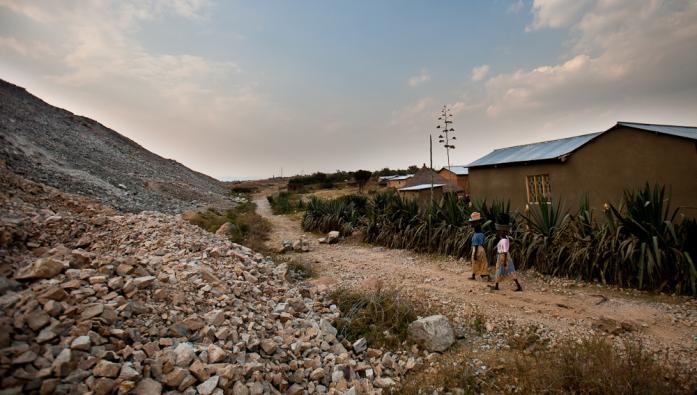The London Bullion Market Authority’s ‘responsible sourcing’ claims challenged by human rights victims in legal case
UK lawyers acting on behalf of Tanzanian human rights victims today announced they were suing the London Bullion Market Association (LBMA) for wrongfully certifying gold from Barrick’s deadly North Mara gold mine in Tanzania as being ‘responsibly sourced’. The legal claim has been issued by family members of two young men shot and killed by security forces at the mine in 2019.
The ground-breaking legal case, filed by law firm Leigh Day, thrusts into the spotlight industry certification schemes which claim to maintain environmental and human rights standards. Such schemes have been multiplying as businesses seek to promote their environmental, social and governance (ESG) credentials, often with little public oversight.
The LBMA’s gold certification scheme is particularly influential as the LBMA oversees the vast $275-billion-a-week London market. It says it has appropriate checks in place to halt tainted gold from entering this market.
The legal action issued at the High Court is the first time in the UK that human rights claimants have sued an industry certification body for an alleged breach of a duty of care owed to them. In this case, the claimants allege that the LBMA’s failure to follow its own rules to stop the trade in tainted gold caused their devastating loss.
RAID is not a party to the legal proceedings but fully supports the Tanzanian claimants’ decision in bringing this claim for remedy.
“We have repeatedly warned the LBMA that it is certifying tainted gold, and now bereaved Tanzanian families are taking direct action.” said Anneke Van Woudenberg, Executive Director of RAID. “This ground-breaking case should send a strong signal to business and regulatory bodies that certification schemes claiming products are ‘responsibly sourced’ cannot be empty ESG rhetoric. Investors and consumer-facing brands that rely on ESG schemes should all sit up and take notice of this critical legal challenge.”
The LBMA’s powers to suspend a gold refiner
The LBMA has the power to suspend or remove gold refiners from its approved ‘Good Delivery’ list, thereby excluding them from London’s globally dominant gold market. The LBMA says refiners on its list must meet its Responsible Gold Guidance, which requires accredited refiners to halt any sourcing of gold from mines where there are known serious human rights abuses or if there are founded suspicions that such abuses are occurring.
Despite these requirements, the LBMA has continued to allow gold from the North Mara mine to be refined and traded. North Mara is a major industrialised gold mine, owned and operated by Canadian mining giant Barrick Gold, one of the largest gold mining companies in the world. A Barrick director sits on the LBMA’s board.
The North Mara mine is one of the deadliest industrial mines in Africa in terms of security related violence. At least 77 people have been killed and 304 wounded, many on multiple occasions, by police responsible for mine security, most since Barrick acquired the mine in 2006. Civil society groups, investigative journalists and a Tanzanian parliamentary inquiry have all reported on the human rights abuses at the mine. Last month, UK corporate watchdog RAID issued a new report highlighting an intensification of the violence, with rising incidents of killings, assaults and torture.
Concerns raised with the LBMA
RAID said it had repeatedly raised concerns directly with the LBMA about the human rights abuses, including in complaints and formal submissions in 2019, 2020 and in 2022, and urged the LBMA to act to stop tainted gold entering the supply chain. Although the LBMA opened a formal ‘Incident Review Process’ in 2019 to look into the human rights issues, it took no action to halt the trade.
In a statement on 4 November, the LBMA said it has closed its 2019 incident review process following the latest site assessment by a social auditor, appointed by the refiner, MMTC-PAMP (part of the Swiss-based MKS PAMP group). The assessment, coordinated with Barrick, found “measurable improvement in the management of the previously identified risks”. Yet it did not address the question of whether there had been a change in the level or nature of security-related violence, and stated that “the potential significant adverse risks remain high”, including concerning “security forces management”. The full assessment report has not been made public. The LBMA confirmed that MMTC-PAMP remains a Good Delivery List refiner.
Barrick has been under increasing pressure about the human rights situation at the North Mara mine. Last month a group of 21 Tanzanians issued a legal claim in Canada against the company. It follows an earlier legal action in 2020 by a group of Tanzanians against Barrick’s subsidiaries in the UK. Both cases are ongoing.

Notes for editors:
The LBMA sets the standards and policies for the oldest and biggest financial gold market in the world. About 70 LBMA accredited refiners, located across 30 countries or so, account for 85-95% of annual refined gold production. It launched its Responsible Sourcing Programme in 2012 for the stated purpose of combatting money laundering, terrorist financing and human rights abuses globally.
In 2021, five human rights and corporate watchdog groups raised concerns with the LBMA questioning the credibility of its responsible sourcing scheme for failing to flag and stop the trade in tainted gold.
Significant weaknesses in the LBMA responsible gold programme mean that downstream customers cannot have confidence that the LBMA’s Good Delivery gold is free of serious human rights abuses and links to conflict. Scores of companies list MMTC-PAMP, the refiner of gold from North Mara, in their gold supply chains – including Apple, Amazon, Tesla, Alphabet and Microsoft.
In recent months, UK regulators have said they will be scrutinising ESG claims by companies more closely. In October 2022, the Financial Conduct Authority said it would be proposing new rules to tackle ‘greenwashing’ including how terms like ‘ESG’, ‘green’ or ‘sustainable’ can be used. The UK’s Advertising Standards Authority also issued a landmark ruling in October against HSBC Bank for misrepresenting its green credentials.
For further information, please see:
- RAID research on the human rights situation at the North Mara mine, which is here.
- RAID’s 2020 Submission to the LBMA
- RAID’s 2022 Submission to the LBMA

